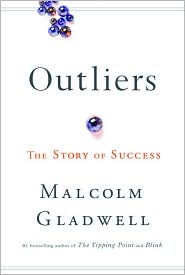Outliers, Malcolm Gladwell
I was first made aware of this title by Pianist's French teacher (he was in 7th grade at the time) in an email. She wanted him to read it. Unfulfilled expectations and all that. This review isn't about him, though. So the day I read the email I put myself on the library waiting list for this book. I was number forty seven. Bummer. It took five months before it was our turn. In the meantime, I watched Charlie Rose's interview with Mr. Gladwell.
In America, the mythos of the self made man is a deeply entrenched, beloved belief that is in some ways central to our culture. Generally, we're supposed to believe that here in the US anyone, from anywhere, from any background can rise to the top of our society through their own hard work & very little else. Like cream rises from milk. Unbidden & naturally. We like to pretend such things are practically guaranteed by the constitution, for heavens' sake! Or so the thought goes.
IMO, it's quite easy to sum up Outliers: it's a thoughtfully written, soundly defended debunking of the myth of the self made man. Mr. Gladwell's position is that preferential treatment can be based on such arbitrary measures as birth dates, generational size and parenting style. He argues that coincidental circumstances and arbitrary random sorting of children often boosts one group over another. Success, according to this position, results from cumulative advantages & isn't merely the result of native ability.
Mr. Gladwell reveals that parenting styles may differ by economic class- and that these seemingly inconsequential differences can ultimately have a serious impact on how much better one child may do as opposed to another. In other words, socialization training taught in the home can have more impact for better or for worse on a child's trajectory than many parents may be willing to admit.In young children an age difference as little as four or six months can make a huge difference in academic and athletic outcomes. He uses the Canadian hockey training system and American kindergartners as effective examples. In other words, future achievement is predicted better by family involvement, location, culture and cumulative advantages that started early in life- not necessarily intelligence quotient, work ethic and other nebulous characteristics.
Mr. Gladwell discusses such vagaries as how Asian language structures inherently confer advantages on their young learners that English does not- giving their children a strong and enduring boost up the ladder that lasts through their childhood into their adulthood. Gladwell shows how it may take a few generations for a family or group to boost itself out of one economic class into another and he tells us how much effort that entails & what the rewards and sacrifices may be.
Outliers isn't a book I'd've necessarily picked up on my own and for that I'm grateful to the French teacher. Anyone who is interested in the sociological origins of success and how various factors impact each individual should pick this up. It's a fascinating read.




6 comments:
He's great, isn't he? He's doing a book launch in my city next week, and I've already got tickets!
You should read his "Tipping Point" as well... fascinating stuff!
Hi Rosario~ Yes, Gladwell is fascinating! Thanks for recommending Tipping Point, I'll add it to my library list.
~Amanda
I really should read something by him. I keep hearing good things, but I haven't got around to anything by him yet.
He's very insightful, I really enjoyed it a lot. Maybe you'd like him!
~Amanda
Anything by Gladwell is food for thought and certainly original thinking. What part of the book made you rethink your definition of success the most?
Steve C.~ I've always thought success is more an effect of successive advantages, rather than one of purely self initiated effort. That's not to say that effort & motivation are the least important factors. Mr. Gladwell reinforced my thinking as opposed to introducing a new concept.
I think his careful discussion of the child hockey players & the kindergartners inspired much conversation and thought here at home. That and the careful explanation of the language differences as relates to math concepts. As an aside, I'm married to a Southerner & the chapters about the concept of honor, specifically in the South, generated lots of discussion! :)
Speaking as a severely mathematically challenged person I read the math sections and a huge light bulb went off in my head. I really wish someone could have explained math to me in similar ways when I was a child. It would have saved me so many stomachaches.
OT~ Love the idea of book podcasts. :) I'm not tech savvy enough to do them myself, but I wish you the best developing your niche.
Happy Reading~ Amanda
Post a Comment